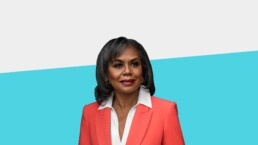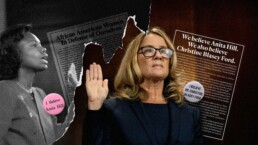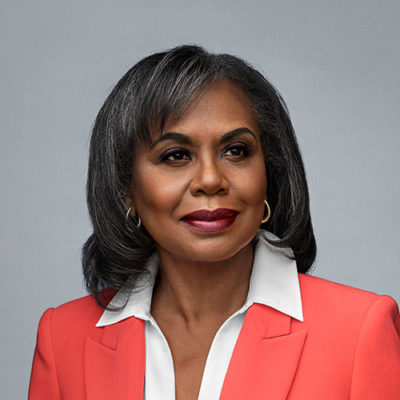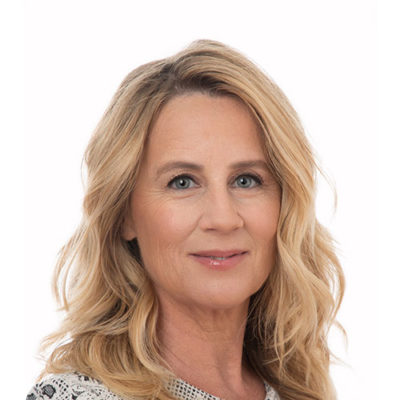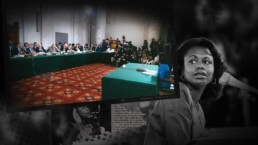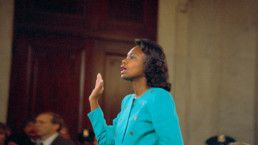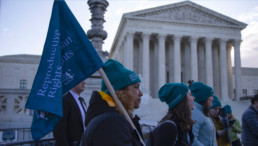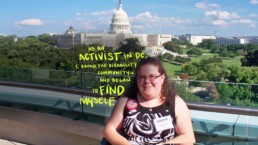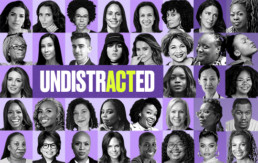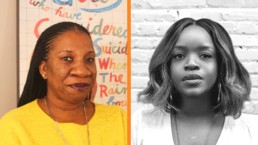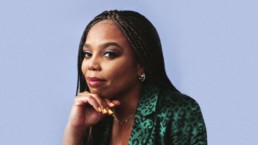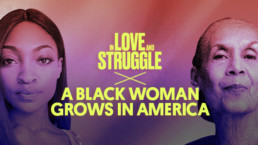One year till the midterms: Come learn what’s ahead
November 3, 2021NEWS,NEWSLETTER
After historic voter turnout during the 2020 election, many states retaliated: This year alone, 19 states have enacted 33 laws that make it harder to vote, including those limiting early and mail-in voting, or establishing more stringent ID requirements. Many of these new restrictions are in states where it was already more difficult to vote, and the measures hit communities of color hardest. And while federal legislation like the Freedom to Vote Act could protect voters’ rights, Senate Republicans recently blocked the bill from receiving a floor vote.
With the 2022 midterm elections looming, there is so much at stake. What can we each do to protect voting rights in the year ahead? Please join The Meteor for One Year Till the Midterms: A Voting Rights Briefing on Monday, November 8, 2021 at 6 pm ET to find out.
JOIN US NOVEMBER 8 TO TALK VOTING RIGHTS
Advocates and legal experts will give us an overview of the current crisis and share how we can all take action. We’ll hear from Melanie L. Campbell, president and CEO of The National Coalition on Black Civic Participation and convener of The Black Women’s Roundtable; election law and voting rights expert Marc Elias, founding partner of Elias Law Group and founder of Democracy Docket; and María Teresa Kumar, founding CEO of Voto Latino, the country’s largest Latinx voter registration and mobilization organization. The conversation will be moderated by filmmaker Dawn Porter, founding member of The Meteor and director of “John Lewis: Good Trouble.”
We’ll learn:
- The current landscape of the voting rights crisis
- The issues at stake as we head into the 2022 midterms—and why protecting voter access now is critical
- Possible solutions to protect voters’ rights—and what’s realistic given our current Congress
- The most important steps we each can take in the year to come
Please join us for this informative free briefing and spread the word—everyone is welcome!
SIGN UP NOW FOR THIS FREE VIRTUAL BRIEFING
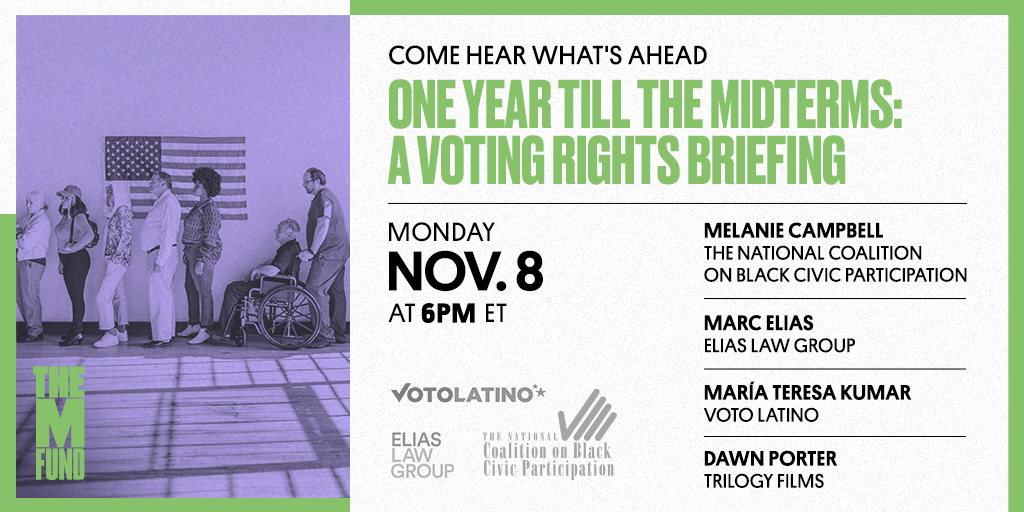
The Meteor Fund welcomes individuals with disabilities to participate in its programs and activities. If you would like to request accommodations or have questions, please contact [email protected] in advance of your participation. Please note that we will make every effort to secure services, but that services are subject to availability.
This workshop is produced by The Meteor and is supported by The Meteor Fund, an affiliated charitable project of The Meteor. The Meteor Fund is fiscally-sponsored by New Venture Fund, a 501(c)(3) public charity.
Photo Credit: Getty Images
Join us in Los Angeles October 16 for a special event with Professor Anita Hill
Thirty years after Professor Anita Hill started a national conversation about sexual harassment in the workplace, how far have we come on issues of gender-based violence? If you’re in the Los Angeles area, please join Dr. Salamishah Tillet and Cindi Leive, hosts of our new podcast Because of Anita, for an afternoon exploring these issues—featuring Professor Hill herself.
Because of Anita: Truth, Justice, Race, Gender, and Power—30 Years Later will be held on October 16 from 3 pm to 6 pm PT at the University of Southern California. This special event will feature artists, scholars, and activists in dialogue, along with a special keynote conversation between Professor Hill, author of Believing: Our Thirty-Year Journey to End Gender Violence, and Beverly Guy-Sheftall, Anna Julia Cooper Professor of Women’s Studies at Spelman College. Rsvp now for this free event.
EVENT DETAILS
DATE
Saturday, October 16, 2021 from 3 pm to 6 pm PT
TIME
3 to 5 pm: Panels and Conversations
5 to 6 pm: Keynote Interview with Professor Anita Hill
LOCATION
Norris Cinema Theatre and Bing Theatre
University of Southern California
Los Angeles, CA
SPEAKERS
Jill Abramson: Senior Lecturer, Harvard University; Co-author, Strange Justice: The Selling of Clarence Thomas
Roxane Gay: Bestselling author; Editor, Not That Bad: Dispatches from Rape Culture
Fatima Goss Graves: President and CEO, National Women's Law Center
Thomasina Gross: Former events server, Chateau Marmont; Actor
Professor Beverly Guy-Sheftall: Anna Julia Cooper Professor of Women's Studies, Spelman College
Professor Anita Hill: Author, Believing: Our Thirty-Year Journey to End Gender Violence
Gabrielle Horton: Audio Storyteller and Adjunct Faculty, USC Annenberg School for Communication and Journalism
Cindi Leive: Co-host, “Because of Anita;” Co-founder, The Meteor
Senator Connie M. Leyva: Member of the California State Senate
Kim Masters: Editor-at-Large, The Hollywood Reporter; Host, KCRW’s “The Business”
Freida Lee Mock: Director, Writer, and Producer, Anita: Speaking Truth to Power, and Ruth: Justice Ginsburg in Her Words
Tony Porter: Chief Executive Officer, A Call to Men
Nina Shaw: Co-founder and Board Member, The Hollywood Commission
Dr. Salamishah Tillet: Co-host, “Because of Anita;” Contributing Critic-at-Large, The New York Times
Scheherazade Tillet: Co-founder and Executive Director, A Long Walk Home
Mily Treviño-Sauceda: Executive Director and Co-founder, Alianza Nacional de Campesinas, Inc.
Professor Miki Turner: Associate Professor of Professional Practice, USC Annenberg School for Communication and Journalism
Jessica Yellin: Peabody, Gracie, and Emmy Award-Winning Political Journalist
The event will also include a performance of “The Scarlet C” by playwright Lynn Nottage, directed by Anita Dashiell-Sparks, professor at the USC School of Dramatic Arts, and featuring USC students Dara Adedara, Kennedy Hill, and Nicole Royster.
Presented by USC Visions and Voices: The Arts and Humanities Initiative and The Meteor. Co-sponsored by the USC Annenberg School for Communication and Journalism, USC School of Cinematic Arts, USC School of Dramatic Arts, and USC Gould School of Law. Special thanks to Audible.
AGENDA
SESSION 1: WHAT HAPPENED?
Opening Remarks
-Willow Bay, Dean, USC Annenberg School for Communication and Journalism
-Daria Yudacufski, Executive Director, Visions and Voices
Re-Examining Anita Hill’s Testimony
Revisiting the fateful October 1991 weekend when Hill testified before the Supreme Court Judiciary Committee that her boss, Supreme Court nominee Clarence Thomas, had sexually harassed her.
-Jill Abramson, Senior Lecturer, Harvard University, and Co-author, Strange Justice: The Selling of Clarence Thomas
-Freida Lee Mock, Director, Writer, Producer, Anita: Speaking Truth to Power, and Ruth: Justice Ginsburg in Her Words
Moderated by
-Cindi Leive, Cohost, “Because of Anita,” and Co-founder, The Meteor
-Dr. Salamishah Tillet, Cohost, “Because of Anita,” and Contributing Critic-at-Large, The New York Times
“Not That Bad”
From Hill's testimony to today, how our culture diminishes survivors’ experiences—and what that costs us.
-Roxane Gay, Bestselling author; Editor, Not That Bad: Dispatches from Rape Culture
Interviewed by
-Professor Miki Turner, Associate Professor of Professional Practice, USC Annenberg School for Communication and Journalism
SESSION 2: WHERE ARE WE NOW?
What the Law Owes Survivors
Hill’s testimony gave way to a dramatic uptick in people filing sexual harassment complaints. We’ll discuss how legal options fit into our path to eradicating abuse at work now.
-Fatima Goss Graves, President and CEO, National Women’s Law Center
-Senator Connie M. Leyva, Member of the California State Senate
Moderated by
-Jessica Yellin, Peabody, Gracie and Emmy Award-Winning Political Journalist
Hotels, Restaurants, and Farms: Report from the Harassment Frontlines
Stories from women who experienced harassment — before and after Hill gave us the language to describe it — and are fighting to make these fields safer.
-Thomasina Gross, Former Events Server, Chateau Marmont, and Actor
-Mily Treviño-Sauceda, Executive Director and Co-founder, Alianza Nacional de Campesinas, Inc.
Moderated by
-Gabrielle Horton, Podcast Showrunner and Adjunct Faculty at USC Annenberg School for Communication and Journalism
Has Hollywood Changed?
Two entertainment leaders who are pushing for accountability take stock and discuss how reporting and data are tools to create progress.
-Kim Masters, Editor-at-Large, The Hollywood Reporter, and Host, KCRW’s “The Business”
-Nina Shaw, Co-founder and Board Member, The Hollywood Commission
Moderated by
-Cindi Leive, Cohost, “Because of Anita,” and Co-founder, The Meteor
In Defense of Ourselves: Demanding Justice for Black Girls and Women
Thirty years after a group of Black feminists showed their solidarity with Hill with “African American Women in Defense of Ourselves,” an ad in The New York Times, what support do Black women and girls critically need from the anti-violence movement?
-Tony Porter, Chief Executive Officer, A Call to Men
-Dr. Salamishah Tillet, Cohost, “Because of Anita,” and Contributing Critic-at-Large, The New York Times
-Scheherazade Tillet, Co-founder and Executive Director, A Long Walk Home
SESSION 3: WHAT’S NEXT?
Special Performance: The Scarlet C
A performance of playwright Lynn Nottage’s “The Scarlet C” in honor of Professor Hill.
Directed by
-Anita Dashiell-Sparks, Professor of Theatre Practice in Acting, Associate Dean of Equity, Diversity & Inclusion (EDI), and Co-Head of Undergraduate Acting, USC School of Dramatic Arts
Performances by
-Dara Adedara, Student, USC School of Dramatic Arts
-Kennedy Hill, Student, USC School of Dramatic Arts
-Nicole Royster, Student, USC School of Dramatic Arts
Keynote Conversation: Anita Hill on Believing
Anita Hill shares her own personal reflections on the hearing and its aftermath — and takes you inside her 30-year journey to end gender violence.
-Professor Anita Hill, Author, Believing: Our Thirty-Year Journey to End Gender Violence
-Professor Beverly Guy-Sheftall, Anna Julia Cooper Professor of Women’s Studies, Spelman College
Listen: Professor Anita Hill & Dr. Christine Blasey Ford
October 11, 2021NEWS,NEWSLETTER
In 2018, Dr. Christine Blasey Ford stood before the Senate Judiciary Committee and testified that Supreme Court nominee Brett Kavanaugh had sexually assaulted her when they were both in high school, allegations he denies. Many of us watched—but perhaps the only person who truly understood what Dr. Ford was going through was Professor Anita Hill, who had appeared before the same committee 27 years earlier.
For the third episode of Because of Anita—our podcast about the legacy of Professor Hill’s 1991 testimony in the Supreme Court confirmation hearings of Clarence Thomas—Professor Hill and Dr. Ford sat down for their first-ever public conversation. The two women discussed their shared experiences, their lives beyond the hearing rooms, and their hopes for the future.
Professor Hill is the Professor of Social Policy, Law, and Gender Studies at Brandeis University and author of the new book Believing: Our Thirty-Year Journey to End Gender Violence. Dr. Ford is a professor at Palo Alto University and Stanford University School of Medicine.
“I THINK THEY DO BELIEVE”
In their intimate, wide-ranging conversation, Professor Hill and Dr. Ford talk about why they testified, who gets believed, and whether they would do it again (short answer: it’s complicated). Just a few highlights:
ON TESTIFYING
Professor Anita Hill: “There was a whole summer experience of uncertainty that I think people don't take into account very much. They think, ‘Okay, she was called to testify, she testified, then she left.’ And they see it as like, that day and that experience. And there is, you know, the lead up to it, the follow up afterwards, that people really aren't quite aware of, I think.”
Dr. Christine Blasey Ford: “Yes. That whole summer was 24/7 stressful. And trying to figure out what I was supposed to do, and how could I communicate the information, and who was the best person to go to, and just really not knowing what to do.”
ON WHETHER THE SENATORS, AND THE PUBLIC, BELIEVE SURVIVORS
Professor Anita Hill: “I think they do believe. I think they’re afraid of believing, so they may even say they don't believe. But I think somewhere inside they do believe, but they're just not willing to do anything about it.”
Dr. Christine Blasey Ford: “Sitting in that room—in that chair—and seeing on people's faces and thinking that they did believe me. If I had to bet, I think most of them did.”
ON THE AFTERMATH OF TESTIFYING
Professor Anita Hill: “I have this very protective instinct, and when we met, one of my concerns was that you were going to be okay. And I did leave feeling assured that you had this strong core that would get you through it.”
Dr. Christine Blasey Ford: “Yes, I remember you saying that I would have a much better perspective in five years, and in twenty five years, so. And you were right.”
Professor Anita Hill: “Well, good, good. I like being right sometimes. Especially about that.”
ON WHETHER THEY WOULD DO IT AGAIN
Dr. Christine Blasey Ford: “All the smear media and the destroying of reputation and attempt at destroying career...and I’m absolutely sure that I would do it again. And that’s not to say that it hasn’t been really, really, really hard and that I’m still not as okay as I would like to be, three years out of the situation… But I do firmly believe I would do it again.”
Professor Anita Hill: “The why that I testified is just as important to me today as it was thirty years ago when I was struggling with this during the summer of 1991. The why is because the Supreme Court matters and who’s on the Supreme Court matters. And I really want to believe in the integrity of that body because we now more than ever see how important the decisions that it makes are to all of us.”
This conversation was powerful to listen in on, and we’re so happy we can share it with you now. Please subscribe so you don’t miss our final episode when it drops. The next episode’s guests include legal advocate Fatima Goss Graves, journalist Irin Carmon, and ‘me too.’ founder Tarana Burke.
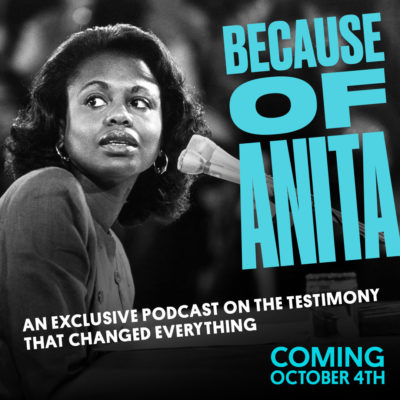
Because of Anita is co-hosted by Dr. Salamishah Tillet, cultural critic at The New York Times, and Cindi Leive, co-founder of The Meteor; it’s produced by The Meteor and Pineapple Street Studios.
Listen now and subscribe on Apple Podcasts, Spotify, Audible, Stitcher, or wherever you get your podcasts.
Photo credit: Bettmann / Getty Images
JOIN US IN LOS ANGELES FOR A SPECIAL EVENT WITH PROFESSOR ANITA HILL
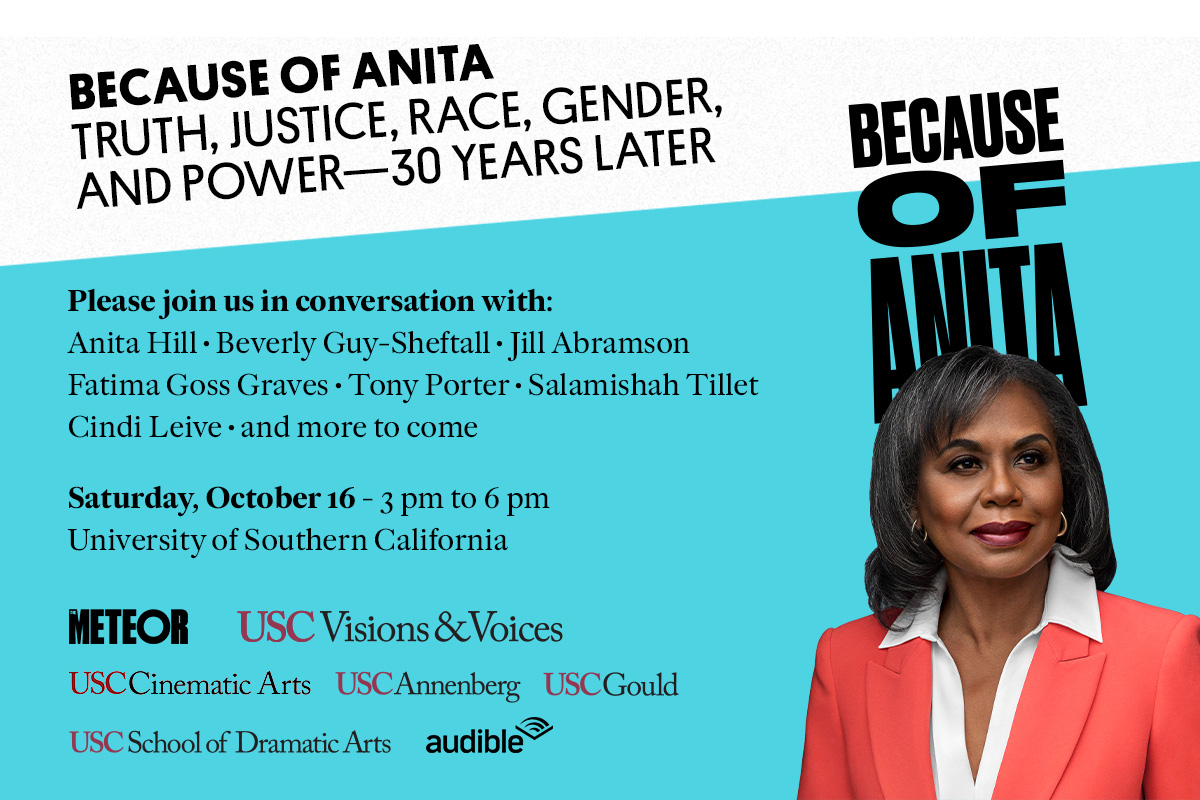
Thirty years after Professor Anita Hill started a national conversation about sexual harassment in the workplace, how far have we come on issues of gender-based violence? If you’re in the Los Angeles area, please join Dr. Salamishah Tillet and Cindi Leive, hosts of our new podcast Because of Anita, for an afternoon exploring these issues—featuring Professor Hill herself.
Because of Anita: Truth, Justice, Race, Gender, and Power—30 Years Later will be held on October 16 from 3 pm to 6 pm PT at the University of Southern California. This special event will feature artists, scholars, and activists in dialogue, along with a special keynote conversation between Professor Hill, author of Believing, and Beverly Guy-Sheftall, Anna Julia Cooper Professor of Women’s Studies at Spelman College. Visit The Meteor for updates. Rsvp now for this free event.
Presented by USC Visions and Voices: The Arts and Humanities Initiative and The Meteor. Co-sponsored by the USC Annenberg School for Communication and Journalism, USC School of Cinematic Arts, USC School of Dramatic Arts, and USC Gould School of Law. Special thanks to Audible.
Because of Anita: Highlights from our hosts
October 4, 2021NEWS,NEWSLETTER
In 1991, Professor Anita Hill told the Senate Judiciary Committee that her former boss, Supreme Court nominee Clarence Thomas, had sexually harassed her. Thirty years later, you can still see the ripple effects of that testimony in our politics—and our lives.
That’s why we—hosts Dr. Salamishah Tillet and Cindi Leive—wanted to take a fresh look at the hearings. We’ve been working on this for months, and our new four-part podcast, Because of Anita, out today, shares what we’ve learned and what we’ve heard from politicians, artists, organizers, and scholars who were shaped by the hearings.
In the first episode—did we mention it’s out today?—we walk you through what actually happened that October weekend 30 years ago, with help from lawyer Kimberlé Crenshaw, who served on Hill’s legal team at the time; journalist Jane Mayer, who helped expose the hearings’ flaws; and actor Kerry Washington, who later immersed herself in the hearings for a film role as Anita Hill.
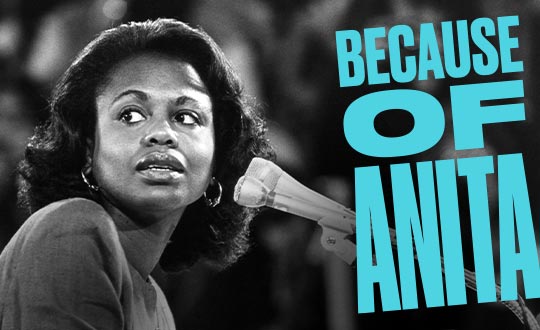
We had different, intersecting reasons for wanting to do this podcast. Salamishah had written about Anita Hill before, for Four Hundred Souls: A Community History of African America, 1619-2019. Revisiting the testimony for that essay—and thinking about the impact it had on her back in 1991, as a Black student in a mostly white high school—was illuminating, and she wanted to share what she’d learned with a different audience. Cindi had known Professor Hill for years—but had never interviewed her, and with the 30th anniversary approaching, couldn’t stop thinking about how far away and yet immediate those 1991 hearings were.
Part of what we both loved about this first episode is the deep dive into what actually happened at the hearings. It’s kind of shocking to listen to in retrospect: the interrogation of Professor Hill’s motives (“are you a scorned woman?” asked one Senator, almost mockingly), the witnesses not called, the spectacle of an all-white, all-male panel ruling on the word of a Black woman. If you’re new to the hearings, we think you’ll be riveted.
And our guests gave us so much to think about. Here are some of our highlights from the conversations in the first episode:
Salamishah: “For me, it’s Kimberlé Crenshaw using Thomas’s ‘high-tech lynching’ line to show the consequence of our country not using an intersectional analysis…or paying attention to how racism and sexism mutually harm Black women and Black communities.”
Cindi: “Professor Crenshaw’s interview had me on the edge of my seat. She was part of Anita Hill’s legal team, and there’s a scene where she and her colleagues walk out of the hearing and run into a group of Black women kneeling and praying on the steps of the Capitol. Crenshaw thinks they must be there to support Anita Hill, but then she realizes that they are there for Thomas. She understands the tide has turned, and it’s a pivotal moment in her life. I had chills when we were recording this.”
Salamishah: “Back then, for lots of Black people racism trumped sexism. Thanks to Hill, and so many other Black feminists, we have a more complex understanding of our oppression, and our resistance to it, today. Another moment that stuck with me is when Jane Mayer notes that the research she and co-author Jill Abramson did for their book Strange Justice: The Selling of Clarence Thomas revealed that there was a high probability that Thomas lied under oath. But as Mayer went on to tell us, ‘There are no statute of limitations for investigating a Supreme Court Justice. And I think that this subject still should be opened up and looked at again.’”
Cindi: “When she said that, I asked her jokingly, ‘Jane, I wonder who would be the journalist to do that investigation?’ But she demurred and said she’d leave that for a new generation. And given Thomas’s importance on the Court, I hope that happens.”
We hope you’ll subscribe so you don’t miss an episode, including a personal conversation between Professor Hill herself and Dr. Christine Blasey Ford, whose 2018 testimony before the Senate Judiciary Committee echoed Hill’s experience 27 years earlier.
Upcoming guests also include scholar Dr. Barbara Ransby, Ambassador Carol Moseley Braun, producer Drew Dixon, legal advocate Fatima Goss Graves, journalist Irin Carmon, and ‘me too.’ founder Tarana Burke.
Because of Anita is co-hosted by Dr. Salamishah Tillet, cultural critic at The New York Times, and Cindi Leive, co-founder of The Meteor; and it’s produced by The Meteor and Pineapple Street Studios. Listen and subscribe now on Audible, Apple Podcasts, Spotify, Stitcher, or wherever you get your podcasts.
Because of Anita: A podcast about the testimony that changed everything
September 24, 2021NEWS,NEWSLETTER
Thirty years ago this fall, in October 1991, Professor Anita Hill delivered groundbreaking testimony in the Supreme Court confirmation hearings of Clarence Thomas. As the world watched, she sat in front of an all-white, all-male Senate Judiciary Committee and testified that Thomas had sexually harassed her years earlier, when he was her boss.
The hearings ignited conversations around race, gender, power, and sexual abuse that are as relevant today as they were three decades ago. Now, Because of Anita, an exclusive four-part podcast series, examines the legacy of Professor Hill’s testimony—and both what’s changed and what has not in the years since then. Co-hosts Dr. Salamishah Tillet, cultural critic at The New York Times, and Cindi Leive, co-founder of The Meteor, sit down with politicians, artists, organizers, and academics—all of whom have been shaped by the hearings, including:
- Professor Anita Hill, in conversation with Dr. Christine Blasey Ford, who testified in the 2018 confirmation hearings of Supreme Court nominee Brett Kavanaugh
- Key players during the 1991 hearings—and their aftermath, like lawyer and Professor Kimberlé Crenshaw, a member of Hill’s legal team; journalist Jane Mayer, who co-wrote a book about the confirmation; and scholar Dr. Barbara Ransby, who rallied Black women in a historic show of support
- Those who felt the ripple effects of Professor Hill’s experience, including Ambassador Carol Moseley Braun, producer Drew Dixon, and actor Kerry Washington
- Leaders in the work on these issues today, including legal advocate Fatima Goss Graves, journalist Irin Carmon, and ‘me too.’ founder Tarana Burke

Because of Anita is produced by The Meteor and Pineapple Street Studios. Making it has been a powerful, illuminating experience for us—we're excited to share it with you. Sign up now to hear every episode when it airs.
Listen now and subscribe on Apple Podcasts, Spotify, Audible, Stitcher, or wherever you get your podcasts.
Photo credit: Bettmann / Getty Images
Abortion access after Texas: Come learn what’s ahead
September 15, 2021NEWS,NEWSLETTER
This month, Texas effectively eliminated nearly all abortion care. Senate Bill 8 (SB8), which bans abortion after six weeks of pregnancy, decimates access for close to 15 million Texans, and will hit Black, Latinx, and immigrant birthing people hardest. And as you’ve probably heard, it even offers a $10,000 bounty to anyone who successfully sues someone for facilitating an abortion after six weeks. What’s more, over a dozen states are poised to enact Texas-style laws, and this fall, the Supreme Court will hear a case that explicitly asks the Court to overrule Roe v. Wade.
So what can we do about this bleak landscape? Come join The Meteor for the workshop After Texas: The Fight for Abortion Access on Monday, September 20, at 5 pm ET, to find out.
JOIN US MONDAY TO TALK ABORTION ACCESS
Organized in partnership with the Center for Reproductive Rights and moderated by Dahlia Lithwick of Slate, this free virtual event will feature experts from the front lines: Amy Hagstrom Miller of Whole Woman’s Health Alliance, part of the coalition to stop SB8; Jenny Ma, one of the CRR attorneys representing the providers in the upcoming Supreme Court case; and Jessica Pinckney of Access Reproductive Justice in California.
We’ll learn:
- What Texas SB8 means for other states around the country
- What SCOTUS could do—and how you can make a difference
- Proposed solutions, including the Women’s Health Protection Act and the Department of Justice’s new lawsuit against Texas
No subject knowledge or organizing experience necessary—everyone is welcome!
MISSED THE WORKSHOP? WATCH IT HERE
The Meteor Fund welcomes individuals with disabilities to participate in its programs and activities. If you would like to request accommodations or have questions, please contact [email protected] in advance of your participation. Please note that we will make every effort to secure services, but that services are subject to availability.
This workshop is produced by The Meteor and is supported by The Meteor Fund, an affiliated charitable project of The Meteor. The Meteor Fund is fiscally-sponsored by New Venture Fund, a 501(c)(3) public charity.
Photo Credit: Alyssa Schukar/Center for Reproductive Rights
Emily Ladau: Disability is part of the human experience
September 9, 2021NEWS,FEATURED STORY
I was born in 1991—just a year after the Americans with Disabilities Act became law—with a genetic joint and muscle disorder called Larsen syndrome. My mom has it, too. My disability has always been part of my life—a natural state of being.
 As the only kid with an apparent disability in my elementary school, I learned quickly what it meant to exist in a body that’s considered “wrong.” I’d often shy away from talking about my disability, and the biggest compliment you could pay me was that you didn't think of me as disabled.
As the only kid with an apparent disability in my elementary school, I learned quickly what it meant to exist in a body that’s considered “wrong.” I’d often shy away from talking about my disability, and the biggest compliment you could pay me was that you didn't think of me as disabled.
But at age 10, I found myself heading in the complete opposite direction, beginning to embrace myself and opening up about my experience as a disabled person in a very public way: by appearing on “Sesame Street.” Hanging out with Big Bird, Elmo, and Oscar the Grouch was a whole lot of fun, but the best part was beginning to find my voice as an advocate. The experience of educating about disability on a national platform showed me the power of storytelling and communicating as a way to break down stigma and debunk stereotypes.

Though I’d planned to become a high school English teacher, the sparks of disability advocacy that started when I was young began to turn into flames. Midway through college, my plans began to shift as I realized that I wanted to pursue advocacy as a career. So, a week after graduation, I went to Washington, DC, to complete an internship program led by the American Association of People with Disabilities. But I gained so much more than work experience. I gained an understanding of disability as an identity and a sense of belonging to something so much bigger than just me. In finding the disability community, I began to find myself.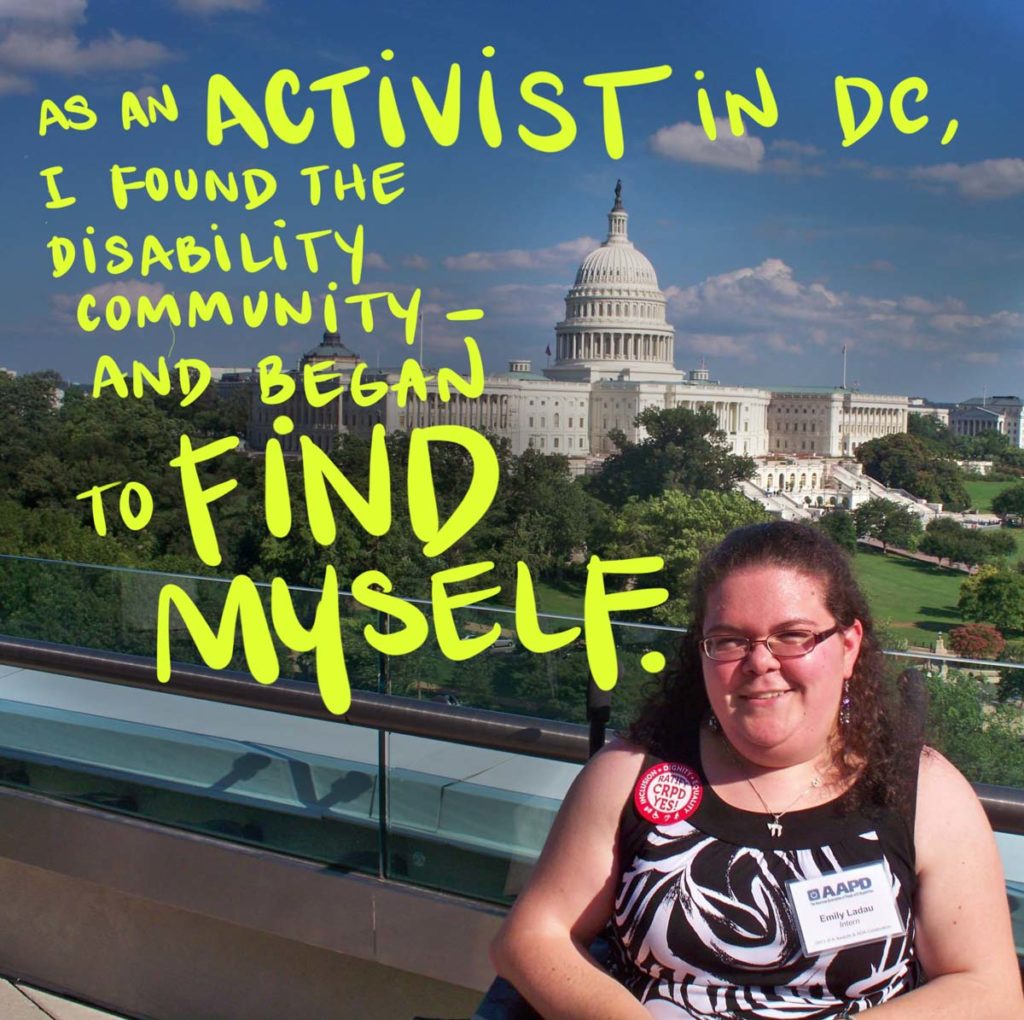
As my passion for activism grew, so too did my realization that if we want the world to be accessible to the disability community, we must make disability accessible to the world. That's not to say I believe disabled people exist simply to be teachable moments, but rather that I believe in meeting people where they're at in a world where disability remains so unfamiliar to so many.
But the disability experience isn’t just my story, or my mom’s story, or any one person’s story. It’s the story of one billion people around the world. And for so many of us, our stories are steeped in ableism, in a lack of acceptance of who we are. My hope is that my new book Demystifying Disability: What to Know, What to Say, and How to Be an Ally, will help to shift the paradigm to a more inclusive world.
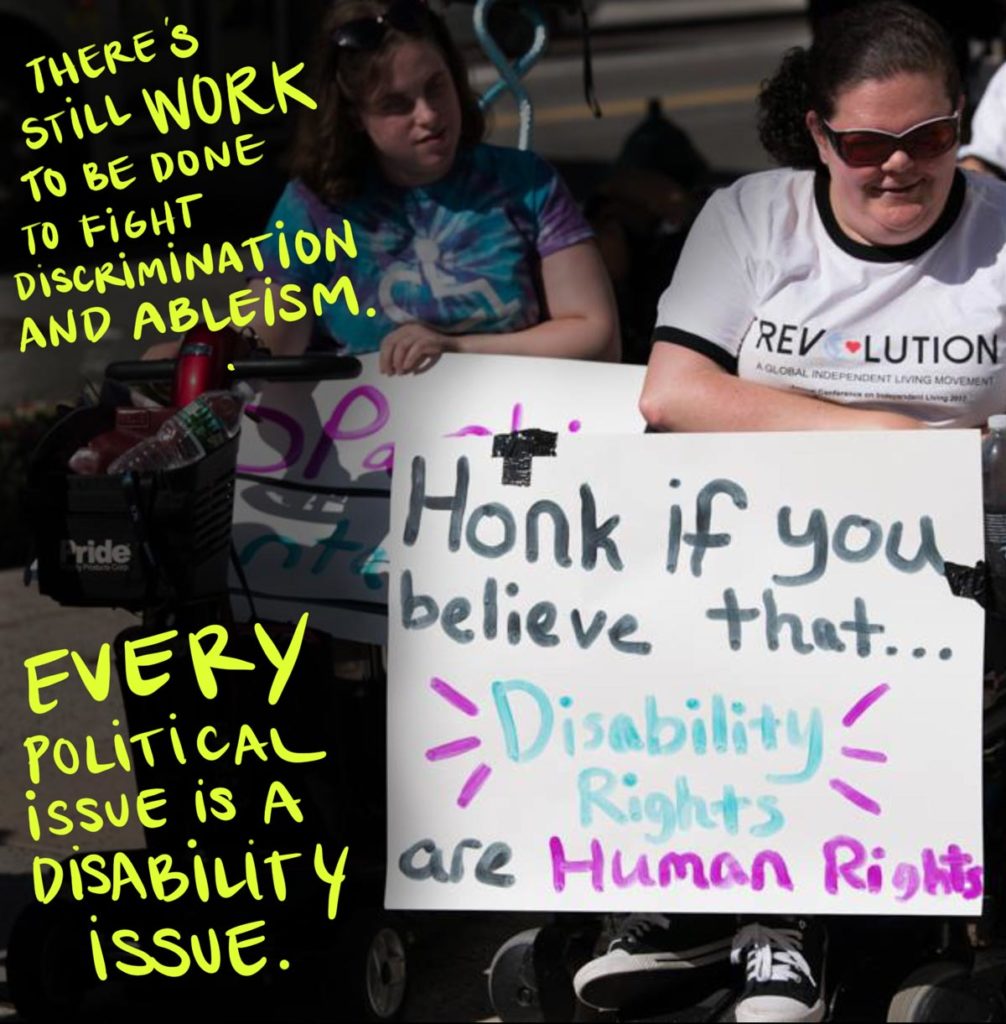
To do this, we first need to understand and recognize ableism and how it manifests in the world.
SO WHAT IS ABLEISM?
Ableism is discrimination and prejudice against people with disabilities, though that’s not quite enough to convey its full weight. So here’s the definition I use. “Ableism is attitudes, actions, and circumstances that devalue people because they are disabled or perceived as having a disability.”
To most of society, ableist beliefs and behavior don’t raise any red flags because they’re woven into the fabric of everyday life, simply accepted as the norm. For disabled people, though, ableism is always there—a part of our lives that never disappears, manifesting in endless forms ranging from broad, systemic discrimination to individual interactions.
HIDDEN DISCRIMINATION EVERYWHERE
Here’s an example. Less than 25 percent of New York City subway stations have elevators. This qualifies as systemic ableism, because the lack of accessibility limits the freedom of disabled people to get around. I do occasionally brave the subway, but it’s not uncommon for me to be the only wheelchair user on the platform. Strangers will express surprise, making individual ableist comments such as, “Wow, it’s amazing how you get around in that chair.” Of course, if every subway station had an elevator, it wouldn’t be considered anything special to see wheelchair users on the train. But many people operate on the assumption that disabled people don’t have full lives that might require public transportation. And if this assumption weren’t embedded in society’s thinking, making sure every subway station has an elevator would be more of a priority. See what I mean? Ableist assumptions lead to systemic ableism, which lead to further discrimination.
Think about it. There are still laws on the books that explicitly discriminate against disabled people. The nearly century-old Fair Labor Standards Act was created to be supposedly “fair” for everyone, but people with disabilities are the only population, as named in the law, who can legally be paid far less than the minimum wage. Even worse, this happens in segregated work environments known as “sheltered workshops” where disabled people are paid a few cents per hour to do repetitive tasks—the same tasks that nondisabled people would be paid at least minimum wage to complete in a regular workplace.
Advocates in favor of sheltered workshops and subminimum wages argue that such things are necessary because the disabled people who work in these conditions would otherwise have no job prospects. Organizations that run sheltered workshops (like Goodwill—sorry, thrifters) think they’re doing a good deed while getting a good deal on labor. But pennies for piecework isn’t acceptable just because the workers are disabled. It’s ableist. Instead of having such low expectations for disabled people, what if we finally left the past behind and demanded fair pay and inclusive workplaces for all?
THE WORLD I WANT
Fighting back against ableism in its many iterations feels like playing a never-ending game of whack-a-mole. Most of the time it’s nondisabled people who take issue with my anti-ableism advocacy. If I speak up about a place that I can’t get into because I use a wheelchair, I’m called a complainer. If I mention that a line in a play I’ve just seen was, in my opinion, ableist, I’m told I’m overthinking things. If I think that a news story about a disabled person overcoming an obstacle is condescending and then comment on it, I’m accused of being bitter and coldhearted. But it’s not bitterness that drives me; it’s my passion to move toward a more accepting, loving, equitable world.
If you’re just starting the journey of figuring out accessibility, there will be a learning curve. After all, accessibility can take many different forms—handrails to hold on to in a bathroom; transcripts for a video or podcast; a website that can be navigated with software that reads text on the screen; using plain, clear language in a document. But I promise it’s not that complicated. A good first step is to do some research: Two of my go-to resources for finding answers are the ADA National Network and the Job Accommodation Network (JAN).
If you’ve been ableist, I don’t want you to feel dismissed for that out of hand. I agree with filmmaker, consultant, and streamer Dominick Evans, who tweeted about ableism: “It’s embedded in our culture, and I had to learn to be better, so how can I expect nondisabled people to know how to be better? What gets me is when people learn the harm they’ve caused, and double down about it.”
I believe that you can do better. We all can.
Emily Ladau is a disability rights activist, writer, and speaker. She is the editor in chief of Rooted in Rights and co host of “The Accessible Stall" podcast and her writing has appeared in The New York Times and HuffPost. A founding member of The Meteor collective, her new book, Demystifying Disability: What to Know, What to Say, and How to Be an Ally, is out now.
Excerpt from DEMYSTIFYING DISABILITY: What to Know, What to Say, and How to Be an Ally.
Copyright © 2021 by Emily Ladau.
Published by Ten Speed Press, an imprint of Penguin Random House.
Illustrations by Bianca Alvarez
"Disability is part of the human experience"
A home for modern feminism
More than a billion people in the world are disabled. And yet ableism is woven into everyday life—shutting people with disabilities out of everything from job opportunities to housing to public transportation.
How can we better understand disability as part of the human experience, and move toward a more inclusive and equitable world? To help everyone have the tools and language to fight ableism, the brilliant Emily Ladau—writer, activist, and founding member of The Meteor—has written Demystifying Disability: What to Know, What to Say, and How to Be an Ally.
EMILY LADAU WANTS TO MAKE DISABILITY ACCESSIBLE
The editor in chief of Rooted in Rights and co-host of “The Accessible Stall” podcast, Ladau’s writing has appeared in The New York Times and HuffPost.
You can get a sneak peek of her new book on our site, where she shares some of her story and ways we can all help build a more inclusive world. Plus head over to our Instagram this Friday, September 10 at 3pm ET, where she’ll be LIVE in conversation with another member of The Meteor collective Liz Plank. The event will have a link to stream live captioning. See you there!
“It is pretty wild to start a podcast in the middle of a pandemic and a revolution and right before a life-changing election. But you know what? That was the point.” So begins Brittany Packnett Cunningham on the season finale of UNDISTRACTED, pointing out that the podcast takes its name from Toni Morrison’s famous quote: “The function of racism…is distraction…. It keeps you from doing your work.”
But even through the year’s distractions, Packnett Cunningham sat down with “thought leaders, freedom fighters…artists and poets and mothers and friends,” examining the week’s news through an intersectional lens. To wrap up Season 1, the UNDISTRACTED staff shared their favorite moments:
Raquel Willis discussing “the complexity of gender and identity”: “One of the things that I am particularly hungry and thirsty for…is for more and more people to understand that we’re all gender nonconforming.” (Shared by producer Rachel Matlow)
The “Nap Bishop” Tricia Hersey on the radical act of rest: “Rest is your divine right; it’s a human right.” (Shared by Ayesha Johnson)
Nikole Hannah-Jones encouraging Black people to “take ownership and pride” of the U.S.: “We built this country and we have a right to claim it.” (Shared by Brittany Packnett Cunningham)
Representative Cori Bush recounting her January 6 experience: “At not one point did I feel like I was about to die…what I felt like was, if you touch these doors and if you come in this place trying to get at my staff…we bangin’ until the end.” (Shared by associate producer Taylor Hosking)
Black Voters Matter founder LaTosha Brown singing when asked about the ancestors who guide her: “Oh, freedom, oh, freedom, freedom over me, over me and before I be a slave, I’ll be buried in my grave, and go home to my Lord and be free.” (Shared by Cindi Leive)
Connie Walker on the present (not just past) of Indigenous women: “This is not ancient history. This is something that is happening now.” (Shared by Treasure Brooks)
Hear the full highlight reel, and catch up on episodes you may have missed, wherever you get your podcasts. We’ll be back with Season 2 in the fall.
Listen on Apple Podcasts, Spotify, Stitcher or wherever you get your podcasts.
Tarana Burke on the past, present, and future of #MeToo
A home for modern feminism
This summer has brought us the devastating reversal of Bill Cosby’s sexual assault conviction—but also something that feels a bit more like justice in the case of New York Governor Andrew Cuomo, who resigned amid sexual harassment charges. With another trial about to begin for R. Kelly, accused of abusing women and girls over two decades, it’s clear that the Me Too movement continues to shape our culture in profound, and hard to simplify, ways.
Against that backdrop, there was no one Brittany Packnett Cunningham wanted to talk to more for her season-finale episode of UNDISTRACTED than Tarana Burke, the founder of Me Too. They sat down to discuss the movement’s journey—and Burke’s own—ahead of the upcoming publication of her memoir, Unbound: My Story of Liberation and the Birth of the Me Too Movement. (Trigger warning: This episode discusses sexual assault.)
“ME TOO HAS BEEN MISUNDERSTOOD”
Highlights of the episode include:
Burke on what people need to know about Me Too: “Me Too, and then the #MeToo movement literally since the day it went viral, has been misunderstood…. I really need people to understand why the work is important. I want people to be connected to just how deeply personal it was.”
Burke on the power of survival: “Every day that I wake up and I am able to function and move through life—even if I’m not doing anything that people think is particularly phenomenal—the act of surviving is powerful in and of itself…. People don’t understand that the violence we experience is akin to death. It is a killing of your spirit and your soul in a way that is very hard to reclaim…. And so survival is a big deal.”
Burke on how Black women get left behind: “When #MeToo went viral, you had white women lifted. And when Black Lives Matter had its moment, you had Black men lifted. Black women—who are the [leaders of] both of those movements—fell by the wayside…. It’s a classic case of Black women getting lost.”
Burke on what was missing when #MeToo went viral: “What you didn’t see were resources…that said, ‘We have to do something to make sure that we don’t live in a world where 12 million people can respond to a hashtag saying they also experienced this violence in 24 hours. That shouldn’t happen.’”
“We didn’t see people, you know, billionaires opening their pockets, saying, ‘What kind of programs can we do? How can we shift this?’ That just didn’t happen. We didn’t see massive legislation.”
“That’s really what the work is about: It’s about making sure survivors have what they need to heal, and gathering as many people as we can in this movement to interrupt and end [sexual violence]…. That’s exactly where we started, and where I stay.”
Listen on Apple Podcasts, Spotify, Stitcher or wherever you get your podcasts.
SUPPORT WOMEN JOURNALISTS COVERING AFGHANISTAN
There are no words for the Taliban takeover in Afghanistan. To learn more, follow this starter list of journalists on Twitter (and journalist organizations to donate to) that we shared on Instagram. Many of them are Afghan women on the ground—and all know the landscape:
Rukhshana Media (@RukhshanaMedia)
Yalda Hakim (@BBCYaldaHakim)
Ruchi Kumar (@RuchiKumar)
Zainab Pirzad (@Zainab_pirzad)
IMS (International Media Support; @forfreemedia)
Real talk: Should the Olympics be saved?
A home for modern feminism
The Olympics is always a contrast of highs and lows, but the lows at this year’s Tokyo Games have been epic. First there was the controversial choice to hold the Olympics during a pandemic—and on top of that there was Sha’Carri Richardson’s disqualification, a ban on Black swimmers’ Soul Caps, and backlash against Simone Biles for prioritizing her mental health. All within the first 10 days!
So: Can these “cursed Olympics” be saved? Should they be? To find out, Brittany Packnett Cunningham sat down with sports journalist Jemele Hill, host of the podcast “Jemele Hill Is Unbothered” and a contributing writer at The Atlantic, this week on UNDISTRACTED.
“THESE TWO WOMEN HAVE SAID: ‘I CHOOSE ME OVER YOUR ENTERTAINMENT.’”
Packnett Cunningham and Hill got into everything about this year’s complicated games—from the message the Olympics sends to Black women athletes to exactly why the Games trail the rest of the sports world on equity issues. Highlights include:
Hill on Simone Biles’s and Naomi Osaka’s choice to prioritize their mental health: “What’s really bothering people when they are reacting so vehemently and angrily toward what they’ve done, is the fact that these two women have said, ‘I choose me over your entertainment, over your ability to watch me perform.’”
Hill on the hypocrisy of Sha’Carri Richardson’s disqualification for marijuana while Alen Hadzic, the U.S. fencer accused of sexual assault, is in Tokyo: “Sha’Carri Richardson is not in the Olympics, but there’s an Olympic fencer who right now is under investigation for multiple sexual assault allegations—multiple—and was allowed to compete. His own team went to the Olympic committee and said, ‘We do not want this guy around us.’”
“Instead, they came up with a ‘safety plan’…. You know that he’s dangerous enough that you need to develop a safety plan, but good enough to represent the country? That math ain’t mathing.”
Hill on the absence of childcare at the Olympics: “The one thing that allows the Olympic committee…to get away with basically not treating Olympic athletes with kind of basic dignity is the fact that we only pay attention every four years. Shame works…I have a feeling if there were just more eyes and more awareness…that they would not be allowed to get away with what they get away with.”
Hill on whether there’s hope for the Olympics despite its history of racism and sexism: “We’re a very segregated society, but when you love the same team, you root for the same athletes, it tends to knock down walls. And so, because of that, I still feel like there’s a lot of hope…what Naomi Osaka is able to do with bringing this conversation about mental health even more into focus. Simone Biles, same thing. Despite the fact they will receive criticisms, I still think it’s doing way more good than harm.”
Listen on Apple Podcasts, Spotify, Stitcher or wherever you get your podcasts.
If you’re looking for a powerful series of stories to open your mind and your heart—well, we’re biased, but we fully recommend In Love and Struggle: A Black Woman Grows in America. This co-production between The Meteor and Audible showcases 11 stories told by Black women about their lives at every age. You’ll hear from music producer Drew Dixon, two-time Pulitzer-winning playwright Lynn Nottage, The Apollo Theater’s Kamilah Forbes, and more. Need more convincing? Watch the contributors in conversation.

